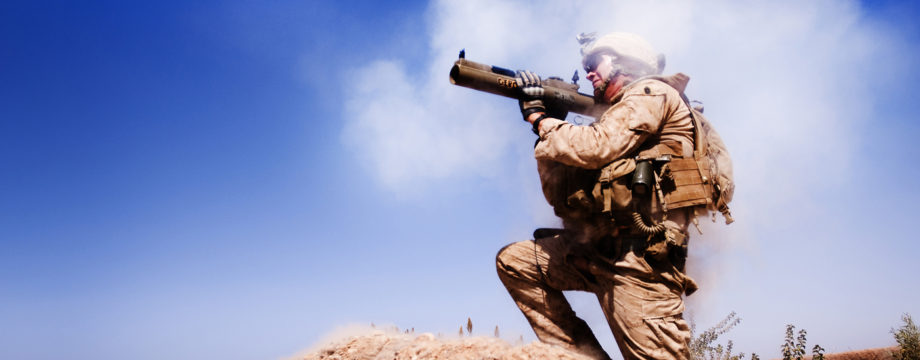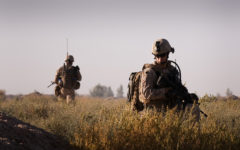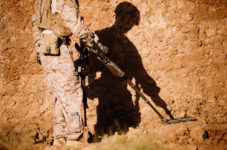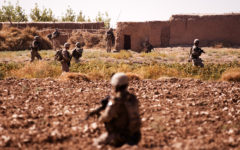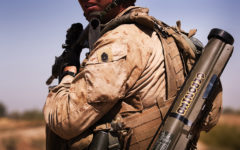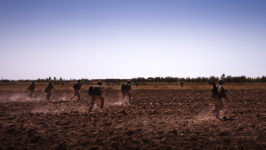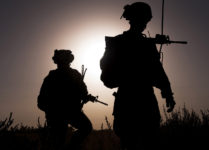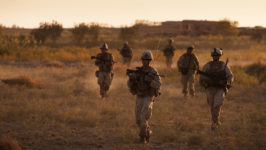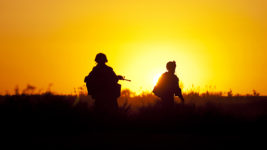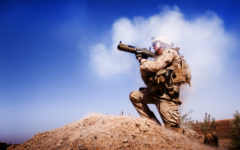
Gunnery Sgt. Chris Denham, India Company. Trek Nawa, Afghanistan. September 2010.
India Company conducted Operation MAKO, a clearing operation looking for enemy weapons caches and fighters in Trek Nawa. — Source: I Marine Expeditionary Force
Contents
News
Marines, Afghan Army conduct clearing mission in Trek Nawa during Operation Mako
By Sgt. Mark Fayloga || September 21, 2010
TREK NAWA, Afghanistan — The men of India Company, 3rd Battalion, 3rd Marine Regiment, were looking for a fight, but it wasn’t a single battle they were interested in; they were hoping to affect future conflicts by upsetting the enemy’s operations and removing weapons caches.
Partnering with Afghan Army soldiers from the 215th Corps, India Company drove the enemy back on its heels, clearing a portion of Trek Nawa during Operation Mako, Sept. 21.
“We disrupted the enemy,” said Capt. Francisco X. Zavala, India Company commander. “We took away some of his weapons and forced him to leave the area, at least temporarily — but that has a ripple effect. Whatever he had planned to do, he has to adjust that now. It shows that on any given day, the Marines can come to his backyard and he has to run.”
As much as the operation was about clearing out weapons caches and uprooting enemy forces, many Marines were more enthusiastic about the prospect of making enemy contact. The previous three times Marines had ventured into the same area in Trek Nawa, they’d drawn fire from enemy forces.
“We’re not combat junkies, running around with romantic feelings about combat or anything like that,” said Gunnery Sgt. Chris Denham, the India Company gunnery sergeant. “But most Marines, especially younger Marines, they want to prove themselves in combat.”
Zavala was sure to hold their eagerness in check, reminding them that as much as they’d all like a battle, the clearing mission came first.
India Company came to the fight with multiple squads on line, spread 3,000 meters across Trek Nawa. The company was supported by two mobile units stationed as blocking positions to prevent enemy withdrawal.
As they pushed through Trek Nawa, all of the enemy signals the men have come to know as indicators of a coming firefight began occurring, but the fight didn’t. With half the day gone, the men moved across the difficult terrain unchallenged, hold for the ankle-hating plowed fields and deep canals. But as second platoon moved forward, the air suddenly filled with the crack of rifles and buzz of bullets.
“I’m surprised it took as long as it did to get into a firefight,” Zavala said. “I expected contact much earlier.”
The Marines and Afghans immediately returned fire, engaging the enemy with rockets, mortars and machine guns. With the enemy pinned down, other elements of India Company maneuvered to target the enemy positions.
“One thing that really impressed me was the awareness all the Marines demonstrated in regards to knowing where all the other elements were and (remaining) conscious to the possibility of fratricide,” Zavala said. “They made sure before taking the shot, that they understood exactly where everybody was at.”
Second platoon’s fire superiority held the enemy forces in cornfields and nearby buildings, such as a compound covered partially from the front by a mosque.
All day, Denham had been carrying around his light antitank weapon, nicknamed Geronimo, and cracking jokes to keep the men at ease.
“Geronimo is getting heavy. He’s ready to go. He’s getting fired today.”
Geronimo got his chance to shine during the last 15 minutes of the firefight. Denham positioned himself on a dirt hill and aligned his shot as accurately as possible. The rocket shot across the battlefield, screaming as it slipped by the side of the mosque and collided with the enemy compound.
“The only thing louder than the back blast of the rocket was the Marines cheering,” Zavala said.
The Marines pushed on, continuing to engage enemy forces while clearing compounds along the way, taking two detainees and sweeping up weapons caches.
For India Company’s leadership, the discipline of their Marines was among the largest victories.
Source: I Marine Expeditionary Force Press Release
Photographs
- Gunnery Sgt. Alexander Mazza, Explosive Ordnance Disposal. Trek Nawa, Afghanistan. September 2010.
- Cpl. Joshua Stamper, Engineers. Trek Nawa, Afghanistan. September 2010.
- India Company during Operation MAKO. Trek Nawa, Afghanistan. September 2010.
- Gunnery Sgt. Chris Denham, India Company. Trek Nawa, Afghanistan. September 2010.
- India Company during Operation MAKO. Trek Nawa, Afghanistan. September 2010.
- Gunnery Sgt. Chris Denham, India Company. Trek Nawa, Afghanistan. September 2010.
- Sgt. Ryan McCreary and Capt. Francisco Zavala, India Company. Trek Nawa, Afghanistan. September 2010.
- India Company during Operation MAKO. Trek Nawa, Afghanistan. September 2010.
- India Company during Operation MAKO. Trek Nawa, Afghanistan. September 2010.
